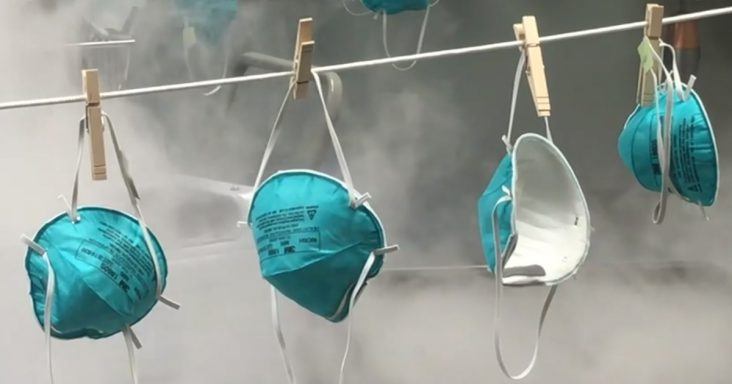Mercy to disinfect and reuse protective equipment
by April 29, 2020 3:06 pm 734 views

St. Louis-based Mercy Health System is maximizing use of protective personal equipment (PPE) required during the COVID-19 pandemic. The health system is disinfecting N95 respirators and other equipment with a hydrogen peroxide misting process that kills viruses and bacteria.
Mercy has been using the Altapure system inside hospitals for years to disinfect patient rooms. By hanging clotheslines in a room the system is now being used to sanitize the masks and PPE collected from around the health system. Mercy said it got the idea from watching researchers at the University of Nebraska, Duke University and the University of Washington who recently began studying the effectiveness of the Altapure system on PPE.
“We began talks early with representatives from Altapure about the possibility of using our existing equipment in this new way,” said Dr. Keith Starke, Mercy’s chief quality officer. “Similar misting systems have since received FDA emergency use authorization.”
Starke said the research shows the system can destroy even hard-to-kill bacteria like C. diff and MRSA which is significant because killing a virus-like COVID-19 is much easier than destroying bacteria.
This process is being used in all of Mercy’s hospitals including Fort Smith. Michael Nolewajka, executive director of logistics for Mercy Fort Smith, said having this surplus supply falls in line with the health system’s forward-thinking mission and that’s a reassurance to Mercy co-workers that they will have the masks they need.
Mercy’s mask disinfection process means more PPE is available if a sudden spike in COVID-19 cases occurs.
“While our current supply of new PPE is sufficient, these disinfected masks are a backup for us,” said Stephen Mackin, Mercy senior vice president. “Our use of the hydrogen peroxide misting system was a proactive step to ensure we’ll have additional reserves if we need them.”
The machine calculates the disinfection cycle time based on the size of the room to ensure all surfaces are sufficiently treated. In general, it takes about an hour and 15 minutes to disinfect a room full of masks. Mercy said it can reprocess as many as 2,500 masks per day using this system, should that volume ever be needed.
Mercy has gone a step further to develop a protocol for saving, disinfecting and storing the used masks. Should the masks be reused, health care workers will be asked to ensure the masks fit securely before they are used.
